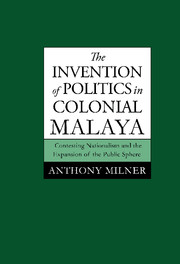 The Invention of Politics in Colonial Malaya
The Invention of Politics in Colonial Malaya Book contents
- Frontmatter
- Contents
- Preface
- Map of Malaya
- Introduction: Colonialism, Nationalism and Contest
- 1 The Ancien Régime: Described and Condemned
- 2 Establishing a Liberal Critique
- 3 A Description of the Real World: Expanding Vocabularies
- 4 Conceptualizing a Bangsa Community: A Newspaper of Moderate Opinions
- 5 Building a Bourgeois Public Sphere
- 6 Ideological Challenge on a Second Front: The Kerajaan in Contest with Islam
- 7 Answering Liberalism: Islamic First Moves
- 8 Kerajaan Self-reform: Chronicling a New Sultanate
- 9 Practising Politics in the Mid-Colonial Period
- 10 Surveying the Homeland: Sedar and Dialogic Processes
- Conclusion: The Malay Political Heritage
- Select Bibliography
- Index
9 - Practising Politics in the Mid-Colonial Period
Published online by Cambridge University Press: 18 December 2009
- Frontmatter
- Contents
- Preface
- Map of Malaya
- Introduction: Colonialism, Nationalism and Contest
- 1 The Ancien Régime: Described and Condemned
- 2 Establishing a Liberal Critique
- 3 A Description of the Real World: Expanding Vocabularies
- 4 Conceptualizing a Bangsa Community: A Newspaper of Moderate Opinions
- 5 Building a Bourgeois Public Sphere
- 6 Ideological Challenge on a Second Front: The Kerajaan in Contest with Islam
- 7 Answering Liberalism: Islamic First Moves
- 8 Kerajaan Self-reform: Chronicling a New Sultanate
- 9 Practising Politics in the Mid-Colonial Period
- 10 Surveying the Homeland: Sedar and Dialogic Processes
- Conclusion: The Malay Political Heritage
- Select Bibliography
- Index
Summary
Is it possible to imagine a conversation taking place in the 1930s between a shari'ah-minded ulama, the chronicler of a royal coronation and a left-wing Malay nationalist? The prospects for such face-to-face discussion about ideology were remote in the pre- or early colonial period. The way certain ulama are ridiculed rather than debated in the Malay Annals is one indication of the presence of a type of ideological or discursive block. Another boundary of incomprehensibility is suggested by the terms in which Munshi Abdullah rejected the ideology of the sultanate: the grounds of his critique diverge so radically from the presuppositions of the kerajaan as to have made it virtually impossible for him to establish a genuine dialogue with the courts.
It was in the rarefied, colonial context of the Keasberry missionary school that a section of the elite of one sultanate began to take note of the doctrines propounded by Abdullah. In this chapter we must be persistently aware, in fact, of the colonial context. To ask about the possibility of ideological conversation in the 1930s involves consideration of the extent to which colonialism promoted new discursive structures in education and numerous other fields. In one sense this decade witnessed an actual sharpening of ideological divisions. But at a deeper level, the intensification of debate – a debate which continued to take place primarily at élite level – draws attention to the further development of a public sphere in which ideological antagonists shared common space.
In this and the following chapter we juxtapose three texts from the 1930s and early 1940s, each radically different in important ways from the others.
- Type
- Chapter
- Information
- The Invention of Politics in Colonial MalayaContesting Nationalism and the Expansion of the Public Sphere, pp. 226 - 256Publisher: Cambridge University PressPrint publication year: 1995
- 1
- Cited by


